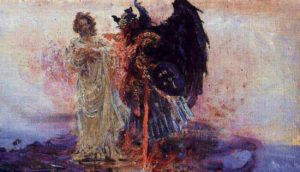
Fifth Element Adage, “Whatever doesn’t kill you
Just Makes You Stronger,” Is This True?
This adage, old saying, keeps cropping up in everyday conversations until it is perceived as true irregardless of whether it is actually true. This is how folk knowledge passes into accepted knowledge without any actual thought as to its validity. The adage appears to comfort those going through some difficult experience hoping they will become better; will they, did you? If the adage were true then there would be little to no Post Traumatic Stress Disorder {PTSD} for everyone would be made stronger through their traumatic experience.
Do the trials of life make one stronger, better prepared to meet future challenges? Or, do these difficulties weaken a person, showing them their vulnerabilities, bringing them to the point of continual despair? This important topic requires a coherent answer rather than a trite adage that has no basis in fact. As Christians we need to find our answers in the Scriptures or else the Bible is of little value in this life; a viewpoint of many. Does the Bible provide a coherent meaningful answer? Let us look into its pages.

Did Christ’s Temptation Make Him Stronger?
Did it Weaken Him? Is He a Fair Example?
In the book of Hebrews the writer states that Christ was made complete through His sufferings. He had to be made like those He came to save so that He could give mercy and compassion from experiential knowledge and not just intellectual facts (He 2:10-18). It was this first-hand experiential knowledge that sets Christianity apart from every other religion. God has compassion. This also sets the Old Testament apart from the New Testament. Before Christ came in the flesh, He was distant. When He came for Adam in the Garden after his sin the encounter lacked compassion even though mercy was demonstrated through the promise of hope for a coming savior (Ge 3:8-21). Certainly the giving of the Moral Law on Mount Sinai was accompanied by thundering, lightnings and smoking of the mount. His booming voice as He uttered each of the Ten Words struck fear into the people’s hearts so that they cowered and did not want to hear His voice again. And hundreds of years later when Elijah was driven to flee Jezebel running to Mount Sinai, he too encountered these phenomenon except, God spoke to him in a still, small voice (1Ki 19:9-13). But the instructions given to Elijah were of judgment for sin.
Thus, when Christ took on flesh He came as a humble slave of God even though He was God’s Son (He 1:1-4). Christ willingly emptied Himself, took the form of sinful flesh, though without sin, and became a slave even to the point of death on the stauros {cross} (Ph 2:1-11). Now, other than being God, how was He able to grow in grace during His trials and death? He laid aside much of His diety, it is a mystery as to what this entails other than He deliberately weakened Himself so as to not destroy His fleshly body (Ex 33:18-20). He did this as an example for all who would be saved and receive the Holy Spirit as the first fruit of their overall salvation (1Co 15:20; 1Pe 2:21).

God Uses the Hagiazo Process
Developing us for Christ’s Body
First, believers must understand that most trials do not come from God (Ja 1:13-18). They often come from Satan and allowed by God (Job 1:8-12; 2:4-6; Lk 22:31-32). In addition, our own sinful desires lead us into sin making us the author of our own troubles. And, our own fleshly bodies retain the sin principle, my words, so that it is in constant rebellion against the in dwelling Spirit so that the things our new covenant nature wishes to do are converted by the flesh into sin (Ro 7:21-25; 8:5-8). If left to our own devices we would remain in sin and the trials and tribulations of life would destroy us; in fact, that is the result when one is without the in dwelling Holy Spirit. Yes, there are some lost people who appear to grow stronger but that is an illusion prompted by Satan. He supports the few in order to confound the many keeping all under bondage to sin and its awful consequences after death. Christians would fare no better except for the one support we are given that even Christ in His flesh needed: in dwelling Holy Spirit.
At His baptism, Christ received the Holy Spirit. Empowered, He began His short ministry of constant trials as Satan sought to cause Him to sin and thus fail in purchasing salvation (Jo 1:32-34). On Pentecost, the Holy Spirit came upon all who believed in Christ as Savior and remained; this began the new covenant salvation spoken of in Jeremiah (Je 31:31-34; Ac 2:1-4). It is the power and support of the Holy Spirit that turns the destructive qualities of trials and tribulations into growth that strengthens our new nature even as it reveals the weakness of our sinful flesh. This is called sanctification though I refer to it according to its Greek wording: Hagiazo Process; making one into holy ones or saints.
This process involves the Father, Son and Holy Spirit working together to fit you into the body of Christ as God planned before Creation (Ep 1:3-14). This triad process is also bound together by one common component; the development of endurance or steadfastness.
The first view of the Hagiazo process in the New Testament is designed to produce hope in believers (Ro 5:1-6). This hope is not a wish for or ephemeral wispy kind of dream. This hope is as solid as faith and grace (Ro 8:23-25). To the lost this sounds like foolishness, and it would be if we did not have the in dwelling Spirit present to support our unbelief and turn it into belief (Mk 9:24).
The next aspect of the Hagiazo Process is the development of endurance (Ja 1:2-4). Herein is where many immature Christians fall away. They faint in the day of adversity because they seek to overcome the trial in their own strength which fails them. Christians cannot endure or stand except in the power and grace of the indwelling Spirit. If we grieve or fight against the Spirit we are defeating ourselves before ever the trial begins.
Finally, we come to the most important aspect of this process: overall character development (2Pe 1:5-11). The other two aspects are out of our control. This aspect is our responsibility. We are to take an active role in the development of our new nature seeking maturity in Christ by developing these qualities: virtue; knowledge, self-c0ntrol; endurance; godliness; brotherly affection; and love for God as the only God. If we neglect this aspect we make ourselves unfruitful and nearsighted all the while pretending we can see and are strong; like the church of Laodicea (Re 3:14-22).
Do not think it strange when these trials come for the world and Satan and your flesh all conspire together to destroy you (1Pe 4:12-16). If you ignore the word of God and flippantly address Christ as pal or buddy you bring trials upon your own head (1Co 11:27-32). Finally, remember the promise of God; there is no temptation except that which is common to everyone and God has provided you a means to endure, His Holy Spirit (1Co 10:13). We will be stretched to our limit because our flesh is unwilling to yield and we oft fall into the trap of trying to stand in our own strength. Therefore, trials faced in this manner weaken us. Only the trials in which we find shelter in the Holy Spirit and prayer to Christ succeed in making us more into the image and maturation of Christ. These are the trials that make us stronger in Him though weaker in self (2Co 12:7-10).
